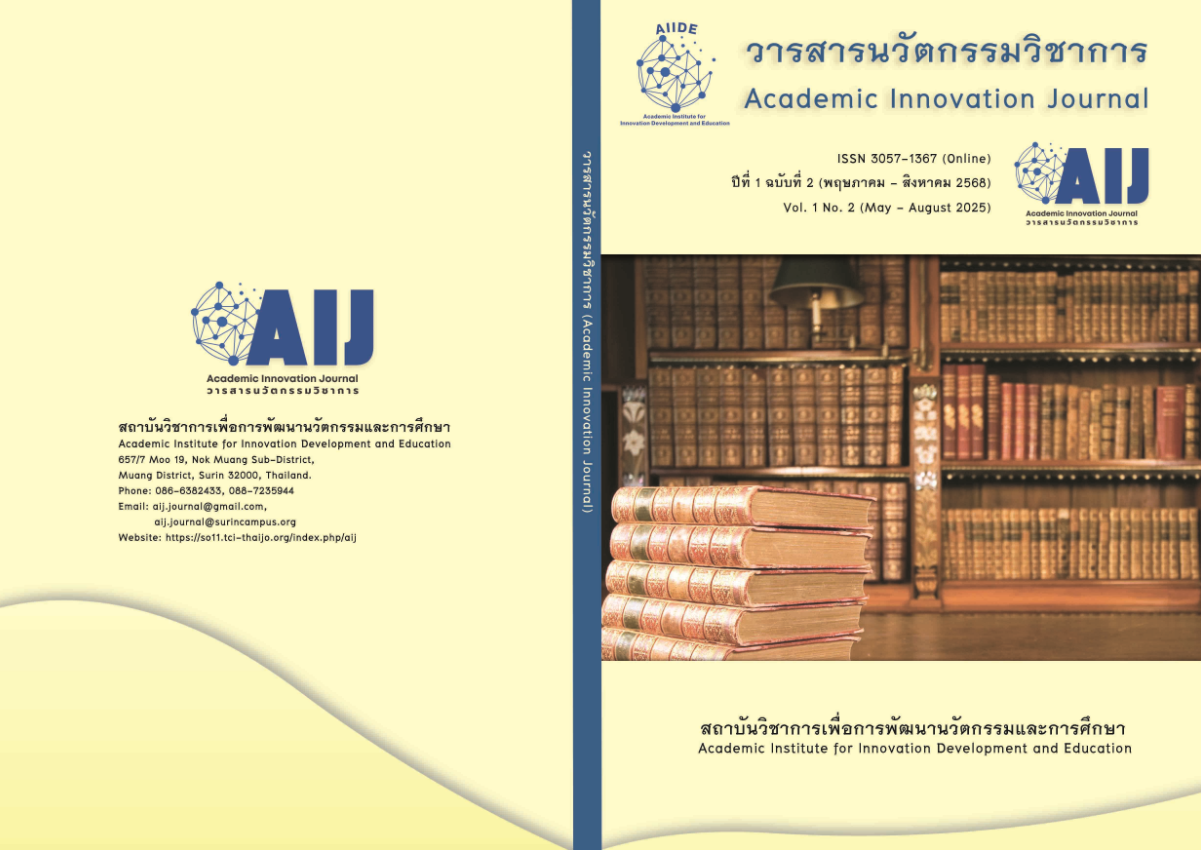The Role of Modern Educational Administrators in Strategically Developing Educational Cooperation Networks
Main Article Content
Abstract
This article aimed to present key strategies that modern educational administrators could adopt to successfully establish and manage educational collaboration networks. The study reviewed relevant concepts and theories regarding the development of educational collaboration networks, including their definitions, types, network management approaches, community and stakeholder participation, and fundamental management principles. It further analyzed the multifaceted roles of modern educational administrators as initiators, strategic direction setters, coordinators and relationship builders, supporters and facilitators, change leaders and inspirers, promoters of participation and empowerment, and monitors and evaluators. The findings indicated that administrators needed to implement essential strategies for building successful networks, including: 1) analyzing the environment and setting clear directions, 2) fostering partnerships and stakeholder engagement, 3) managing networks effectively, 4) strengthening relationships and communication, 5) conducting monitoring, evaluation, and continuous learning, and 6) ensuring network sustainability. In conclusion, a thorough understanding of these roles and the application of appropriate strategies, coupled with awareness of potential challenges, enabled modern educational administrators to enhance the quality of education in a sustainable manner.
Downloads
Article Details

This work is licensed under a Creative Commons Attribution-NonCommercial-NoDerivatives 4.0 International License.
References
Annet, K. A. (2025). Networking Opportunities for Educational Leaders. Research Invention Journal of Research in Education, 5(2), 59–64. https://doi.org/10.59298/RIJRE/2025/525964.
Bootsaenkhot, K., & Ruangmontri, K. (2023). The Guideline Development for Empowering Cooperative Networks in Small Schools Under the Office of Mahasarakham Primary Educational Service Area 3. Journal of Buddhist Philosophy Evolved, 7(2), 290-303. (In Thai)
Dakhuntod, P. (2016). Guidelines for the Relationship Network Management toward ASEAN Community in Primary Schools in Pathum Thani Province. [Master’s thesis, Rajamangala University of Technology Thanyaburi]. DSpace at Rajamangala University of Technology Thanyaburi. http://www.repository.rmutt.ac.th/dspace/handle/123456789/3125. (In Thai).
Eva, N., Robin, M., Sendjaya, S., Van Dierendonck, D., & Liden, R. C. (2019). Servant Leadership: A Systematic Review and Call for Future Research. The Leadership Quarterly, 30(1), 111–132. https://doi.org/10.1016/j.leaqua.2018.07.004.
Lipscombe, K., Buckley-Walker, K., & Tindall-Ford, S. (2023). Middle Leaders’ Facilitation of Teacher Learning in Collaborative Teams. School Leadership & Management, 43(3), 301–321. https://doi.org/10.1080/13632434.2023.2215803.
Mahasaro, P., & Noirid, S. (2020). The Development of Guidelines for the Participation of the Community in Basic Educational Management of Small Schools under the Office of MahaSarakham Primary Educational Service Area Office 2. Academic Journal of Mahamakut Buddhist University Roi Et Campus, 10(1), 363–372. (In Thai)
Mahawong, J., Jansila, V., & U-nakarin, T. (2016). Administrative Network Model for Academic Collaboration of Schools in Remote Hilander Areas. Journal of Education Naresuan University, 18(4), 114-127. (In Thai)
Nilkaewbowonvit, P., Chaichompu, S., & Wong-nam, P. (2016). Model of Academic Cooperation Network Development of Primary Educational Service Area Offices under the Office of Basic Education Commission. Journal of Education, 27(3), 18-32. (In Thai)
Okwir, N. A. (2025). The Role of Continuous Learning in Educational Leadership. Research Invention Journal of Research in Education, 5(1), 53–59. https://doi.org/10.59298/RIJRE/2025/515359.
Runcharoen, T. (2007). Professionalism in Educational Management and Administration in the Era of Educational Reform (4th ed.). Khaofang Publishing. (In Thai)
Saengnet, B., & Chaisuwan, S. (2022). Synergistic Leadership and Relationship with the Community of School Directors Under the Samut Prakan Secondary Education Service Area Office. Journal of Educational Review Faculty of Education in MCU, 9(3), 307–320. (In Thai)
Şahin, N., & Bilir, F. P. (2024). The Effect of Transformational Leadership and Personal Cultural Values on Creating a Learning Organization. Humanities and Social Sciences Communications, 11(1), 206. https://doi.org/10.1057/s41599-024-02701-6.
Sarabut, S. (2020). Development Of School Network Administration. Buabandit Journal of Educational Administration, 20(4), 59-66. (In Thai)
Suksawat, P. (2023). The Area Network Administrative Model for Learning Resources Development of Wiangpapao Wittayakom School, Chiang Rai Province. Journal of Social Science and Cultural, 7(6), 296–309. (In Thai)
Töre, E., & Uzun, B. (2024). The Effect of Empowering Leadership Characteristics of School Principals According to Teachers’ Perceptions on Teachers’ Psychological Ownership and Work Engagement. Participatory Educational Research, 11(3), 165–183. https://doi.org/10.17275/per.24.40.11.3.
Tran, H., Dou, J., Ylimaki, R., & Brunderman, L. (2022). How Do Distributed and Transformational Leadership Teams Improve Working Conditions and Student Learning in Underperforming High-Needs Schools?. European Journal of Educational Management, 5(1), 1–14. https://doi.org/10.12973/eujem.5.1.1.
Waemusor, S., Jorajit, S., & Nawsuwan, K. (2019). Strategic Management Factors and Indicators of the Offices of Private Education in Southern Border Provinces. Hatyai Academic Journal, 17(2), 243-262. (In Thai)
Wongyotha, J., & Petwisit, B. (2024). Guidelines for Collaborative Networks of Education Management for Special Education Center Network Group 9 Under Special Education Bureau. Srinakharinwirot Academic Journal of Education, 25(2), 156-177. (In Thai)


